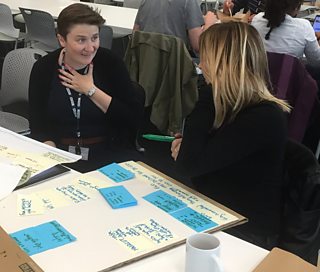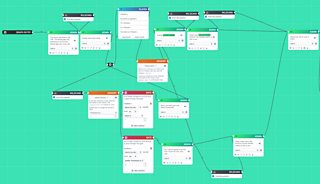Here at Βι¶ΉΤΌΕΔ Writersroom we have always been interested in new forms of storytelling and what effect they could have on the evolution of scripted narratives for broadcast to a mass audience. So when the Βι¶ΉΤΌΕΔ’s R&D department approached us as they were looking for writers for an AI storytelling project, involving an interactive Chatbot and a new product called Charisma.ai, we jumped at the chance to be involved.
As a result two interactive stories have now been published on the Βι¶ΉΤΌΕΔ's Taster platform:
The Act written by Alys Metcalf
Catfish written by Sonia Jalaly.
Have a go at both now and let us know your feedback by answering the questions provided.
We also asked Alys to explain some of the challenges of developing and writing a story in an unfamiliar medium.

The Act written by Alys Metcalf using Charisma.ai
I have a fuzzy memory of being around eight-years-old, sitting in front of a computer screen practically half the size of my entire body, staving off tears of frustration. Despite typing into the keyboard as many verbs as my childhood brain could muster, nothing seemed to get me out of the ‘pitch black room’ that was supposedly ‘spinning very gently’ around my head.
Those of you familiar with the of The Hitchhiker’s Guide To The Galaxy may appreciate my frustration (though I’m guessing you probably got a lot further than the initial dark bedroom!) That was my first taste of interactive storytelling, and since then I’ve become increasingly interested in the medium, particularly how it hands over a degree of creative control to the ‘player’, giving them the opportunity to influence the narrative for better… or for worse. Instead of passively digesting entertainment, interactive stories endow us with a level of control, forcing us to engage with the characters and their journeys on a much deeper level: creatively, psychologically and sometimes even morally. Black Mirror’s characteristically dystopian episode is a perfect example of this. Whether you liked it as a form or not, I’m sure a lot of us were left questioning our own moral compass by the end. We reflect on the story as a viewer, but the interactive element means the direction of the story also reflects on us.

Alys Metcalf (r) developing her story with Producer Sophie Sampson (l)
I was called into a Βι¶ΉΤΌΕΔ writing workshop last year, under the ambiguous understanding it had something to do with A.I. My first reaction was one of shock, um…I think you mean someone else, right? After all, I generally write comedy / drama, and my technical abilities basically extend to turning a laptop off and on again when it’s frozen. As far as A.I. is concerned, the advancement of robots properly freaks me out and somewhere deep down I do sort of think, in spite of all its incredible achievements, that we’ll inevitably exploit technology until it outsmarts us; leading to our ultimate downfall. I mean, if Hollywood sci-fis have taught us anything…it’s that…right?
However, I was pretty relieved to discover that this particular workshop had nothing to do with summoning the likes of into the writers' room. Instead, we were to learn how to use a new piece of programming software, called Charisma.ai, in order to write a two-hander interactive story to be played online.
Charisma.ai is a platform that enables writers to intuitively program character dialogue and player responses through a series of connected nodes. The result is essentially a narrative-driven conversation, that is somewhere between a traditional chatbot (check out ) and a choose your own adventure. Despite sounding a bit complicated (and it definitely was a learning process to get to grips with), the basics were relatively fast to learn and I’m pleased to say there were surprisingly few moments of slamming the computer keyboard like an eight-year-old.

Under the bonnet of Charisma.ai - just a small section of the connected nodes that make up Alys's story The Act
At the end of the two-day workshop we were asked to pitch potential story ideas that would be made for the Βι¶ΉΤΌΕΔ Taster online platform. I wracked my brain for something that played into my strengths (no sci-fi then!) and pitched a comedy idea called The Act. The premise is that the ‘player’ is the Artist Manager of a world-renowned popstar, who is shortly due to perform a big arena gig…but has gone AWOL. The ‘player’ needs to get to the bottom of the popstar’s problem and to convince them to perform. If the ‘player’ is successful then the popstar will perform, but there are various other roads to go down and different outcomes, some more ridiculous than others! I wanted to introduce a level of jeopardy into the mix – that the ‘player’ will potentially lose their reputation and have to face the fans’ wrath if they don’t manage to convince the popstar to perform. This is partly to motivate the ‘player’ to keep invested in the story and also to up the tension and excitement, so they feel that there is something at stake.
I wanted to flesh out the popstar role, ‘Zeejee’, as a three-dimensional, nuanced character, with various quirks and hang-ups. He is charming and funny, but insecure about his abilities as a singer and can sometimes be overly-dramatic and petulant. From time to time, ‘Zeejee’ resembles the stereotypical diva-ish popstar, with ridiculous demands on his rider and the need for constant reassurance. But ultimately, the ‘player’ has the opportunity to get to know the real man behind the façade. We never see ‘Zeejee’, as the interaction is all through typing, so I had to work hard to bring him to life in other ways - one of which was by hearing him sing a section of his new song, after the ‘player’ helps him come up with some new lyrics.

Catfish written by Sonia Jalaly
It’s taken me slightly longer than originally anticipated to write The Act, for a few reasons (…and for once it had nothing to do with self-discipline…although my living room is always curiously clean when there’s a deadline!) One of the challenges is you need to program many diverse responses for ‘Zeejee’, to respond to whatever the ‘player’ types, and it’s almost impossible to second guess what someone might write. So I took a good amount of time coming up with a range of reactions. When programming the potential ‘player’ responses, there’s the option of inputting a ‘wildcard’ node, which accounts for any unanticipated phrases or words. It’s important to make the ‘character’ responses to these wildcards sound specific and tailored.
It’s hard to road-test your own story, as inevitably your own mind works in a specific way and someone else’s is entirely different. Helpfully, The Act was sent out to some people for play-testing, who kindly looked for any bugs, problems in the programming, or strange moments in the dialogue. Fingers crossed anything like this has been ironed out! Top tip: if you break the game, you could always try turning it off and on again?!
It’s been a really enjoyable experience getting to grips with this piece of technology and learning a new skill. I wonder if interactive storytelling really is the way forward for mainstream media, in dramas, sitcoms and films?

Alys Metcalf (l) writer of The Act and Sonia Jalaly (r) writer of Catfish. Both interactive stories are available now on Βι¶ΉΤΌΕΔ Taster.
Broadly speaking, we’ve become accustomed to having zero input when watching TV / online programmes, other than to turn the volume up. With the development of A.I. in storytelling (including Virtual Reality), we’ll soon have the ability to dictate the direction of our favourite drama, whilst sensorially being a part of it too. In terms of audience enjoyment, I suppose it depends on what you’re after - whether you want that level of agency and immersion. I recently watched cheerleading documentary on Netflix (hope it’s not blasphemy to mention Netflix on a Βι¶ΉΤΌΕΔ platform?!) and my god, I would not want to have any interactive part to play in that series. Not unless I had hefty health insurance and a history of being tossed into the air like a devil stick and landing to tell the tale.
But there is something in the thrill of losing yourself in an interactive story. In the chance to step out of your own shoes for a moment and walk in another’s. To speak to characters and temporarily live in worlds you may never otherwise experience. Socially, it may even help build empathy and understand each other’s perspectives a little better… or perhaps it’ll create a league of amoral sociopaths…who knows!
For now, using Charisma AI has given me a fantastic opportunity to explore a different form and discover that, ultimately, the player has as much of a part to play as the writer as I do.
There’s something weirdly fulfilling and freeing about that.
Try The Act, written by Alys Metcalf on Βι¶ΉΤΌΕΔ Taster
